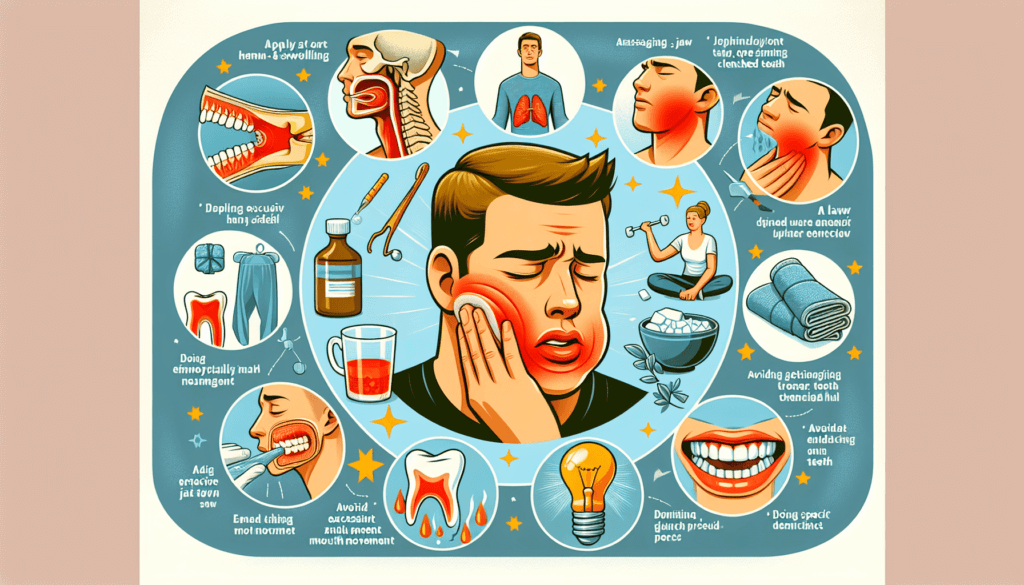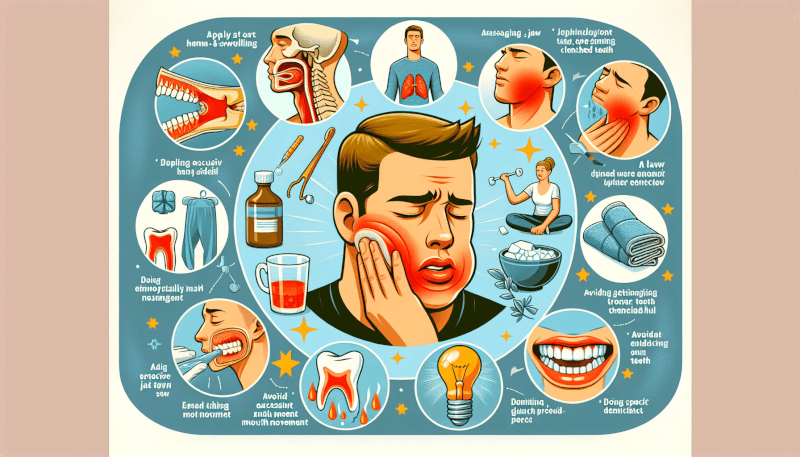If you’ve ever experienced the discomfort of jaw pain and swelling, you know just how frustrating it can be. Whether it’s caused by a dental issue, temporomandibular joint disorder (TMJ), or even just excessive chewing, finding relief is essential. Fortunately, there are plenty of natural home remedies that can help alleviate the pain and swelling, allowing you to get back to your normal daily activities with ease. From applying warm compresses to practicing jaw exercises, these remedies are simple, effective, and easily accessible for everyone. Say goodbye to that nagging jaw pain and swelling with these tried-and-true solutions!
Hot and Cold Compress
Hot compress
A hot compress is a simple and effective way to alleviate jaw pain and swelling. Applying heat to the affected area helps to relax the muscles and reduce inflammation. To use a hot compress, soak a clean towel in hot water, making sure the temperature is tolerable for your skin. Wring out the excess water and place the towel on your jaw, keeping it in place for 10 to 15 minutes. Repeat this process several times a day for optimal results.
Cold compress
Alternatively, you can use a cold compress to relieve jaw pain and swelling. The cold temperature helps to numb the area and reduce inflammation. To make a cold compress, wrap a few ice cubes in a thin cloth or towel. Gently apply the compress to the affected area for about 10 minutes. Take a break of 10 minutes and repeat the process as needed. Be sure to never apply ice directly to the skin, as it can cause frostbite.
Saltwater Rinse
Prepare the solution
A saltwater rinse is a natural remedy that can help alleviate jaw pain and swelling. To prepare the solution, mix half a teaspoon of salt in a glass of warm water. Stir the mixture until the salt is fully dissolved.
Rinse your mouth
Gently swish the saltwater solution in your mouth, focusing on the area of the jaw that is causing you pain. Try to hold the solution in your mouth for at least 30 seconds before spitting it out. Repeat this process three to four times a day, or as needed.
Repeat as needed
Saltwater rinses can help reduce inflammation and promote healing in the jaw area. Therefore, it is recommended to continue using this remedy until your symptoms improve. If your pain and swelling persist for more than a few days, it is advisable to consult a healthcare professional for further evaluation.

Herbal Remedies
Turmeric
Turmeric is a natural anti-inflammatory agent that can help reduce jaw pain and swelling. Its active compound, curcumin, has been found to possess analgesic properties. You can consume turmeric by adding it to your meals or by making a paste. To make a paste, combine one teaspoon of turmeric powder with enough water or coconut oil to form a thick paste. Apply this paste to the affected area, leaving it on for about 15 minutes before rinsing it off with warm water.
Ginger
Ginger has been used for centuries as a remedy for various ailments, including jaw pain and swelling. It contains gingerols, which have anti-inflammatory properties. To use ginger for jaw pain, you can make ginger tea by boiling a few slices of fresh ginger in water for about 10 minutes. Strain the tea and let it cool down before drinking. You can also apply a ginger poultice directly to the affected area for localized relief.
Clove oil
Clove oil is known for its analgesic and anti-inflammatory properties, making it an effective remedy for jaw pain. To use clove oil, soak a cotton ball in the oil and apply it to the affected area for about 10 minutes. Alternatively, you can mix a few drops of clove oil with a carrier oil, such as coconut oil, and gently massage it into the jaw muscles. This will help reduce pain and inflammation.
Massage
Apply gentle pressure
Massaging the jaw area can help relieve tension and reduce pain. Start by applying gentle pressure with your fingertips to the muscles around the jaw joint. Use circular motions and gradually increase the pressure as tolerated. Be cautious not to apply too much pressure, as this can exacerbate the pain or cause discomfort.
Massage with essential oils
To enhance the therapeutic benefits of the massage, you can incorporate essential oils known for their analgesic properties. Lavender, peppermint, and eucalyptus essential oils are good choices. Mix a few drops of your chosen oil with a carrier oil, such as almond or jojoba oil, and massage it into the jaw muscles using gentle circular motions. The soothing aroma of the essential oils will further enhance relaxation and pain relief.

Over-the-Counter Pain Relievers
Ibuprofen
Ibuprofen is a nonsteroidal anti-inflammatory drug (NSAID) that can help alleviate jaw pain and reduce inflammation. It works by inhibiting the production of prostaglandins, which are chemical compounds that cause pain and inflammation. Follow the recommended dosage instructions on the packaging and consult a healthcare professional if you have any underlying medical conditions or are taking other medications.
Acetaminophen
Acetaminophen is another over-the-counter pain reliever that can help manage jaw pain. Unlike ibuprofen, acetaminophen does not have anti-inflammatory properties. However, it targets the brain to reduce pain signals. As with any medication, it is important to follow the recommended dosage instructions and consult a healthcare professional if you have any concerns or questions.
Resting the Jaw
Avoid excessive chewing
One of the causes of jaw pain is excessive or repetitive chewing. To promote healing and reduce strain on the jaw muscles, it is important to avoid foods that require excessive chewing, such as tough meats or chewy candies. Opt for softer foods that are easier to chew, such as cooked vegetables, yogurt, or mashed potatoes.
Avoid clenching or grinding teeth
Clenching or grinding your teeth, especially during sleep, can worsen jaw pain and contribute to muscle tension. If you struggle with teeth clenching or grinding, consult a dentist who may suggest wearing a dental splint or mouthguard to protect your teeth and alleviate jaw pain.
Use a soft diet
For a period of time, consider opting for a soft diet to reduce strain on the jaw muscles. This includes foods that are easy to chew and do not require excessive effort, such as soups, smoothies, and scrambled eggs. Gradually reintroduce harder foods once your jaw pain subsides.
Moist Heat Therapy
Apply a warm towel
Moist heat therapy can help relax the jaw muscles and alleviate pain. To apply moist heat, soak a clean towel in warm water. Wring out the excess water and apply the warm towel to the affected area. Keep it in place for 10 to 15 minutes, repeating the process several times a day or as needed.
Use a heating pad
Alternatively, you can use a heating pad to apply heat to the jaw area. Set the heating pad to a low or medium setting and place it on the affected area for 15 to 20 minutes. Make sure to follow the instructions provided with the heating pad and never apply it directly to the skin to prevent burns.
Aloe Vera
Apply aloe vera gel
Aloe vera has soothing and anti-inflammatory properties, which can help reduce jaw pain and swelling. Apply a small amount of aloe vera gel directly to the affected area and gently massage it into the skin. Leave it on for a few minutes to allow the gel to penetrate the skin and provide relief.
Rinse off with water
After leaving the aloe vera gel on your jaw for a few minutes, rinse it off with water. Pat your skin dry with a soft towel. Repeat this process two to three times a day to continue benefiting from the soothing properties of aloe vera.
Avoiding Trigger Foods
Citrus fruits
Citrus fruits, such as oranges and lemons, can be acidic and may irritate the jaw area, leading to increased pain and discomfort. Avoid consuming these fruits until your symptoms improve. Instead, opt for fruits with a milder acidity, such as apples or bananas.
Hard or chewy foods
Hard or chewy foods can put additional strain on the jaw muscles and worsen pain. Avoid foods that require excessive chewing, such as tough meats, nuts, or chewing gum. Opt for softer options that are easier to chew, such as cooked vegetables, pasta, or fish.
Maintaining Good Oral Hygiene
Brush twice a day
Maintaining good oral hygiene is crucial for overall oral health, including the jaw. Brush your teeth twice a day using a soft-bristled toothbrush and fluoride toothpaste. Be gentle while brushing to avoid putting unnecessary pressure on the jaw joint.
Floss daily
Flossing is an essential part of preventing gum disease and maintaining healthy teeth and gums. Use dental floss or interdental brushes to clean between your teeth and along the gumline. This helps remove food particles and plaque, reducing the risk of inflammation and infection in the jaw area.
Use a mouthwash
Using a mouthwash can complement your oral hygiene routine by providing additional cleansing and freshening benefits. Choose a mouthwash that is alcohol-free and contains antibacterial properties. Rinse your mouth with the mouthwash for about 30 seconds after brushing and flossing.
By following these home remedies for jaw pain and swelling, you can effectively manage your symptoms and promote healing. Remember that if your pain and swelling persist or worsen, it is important to seek medical attention to investigate potential underlying causes and receive appropriate treatment. Take care of your jaw and prioritize your oral health to ensure a pain-free and comfortable life.

